Triboulet (1923) is an Italian period piece directed by actor Febo Mari for the Società Italiana Cines and the UCI. Achille Vitti played King Francis I of France, Umberto Zanuccoli played the title role, the historical jester of the kings Louis XII and Francis I of France, and Elena Sangro played Giletta. G.B. Falci in Milano was the publisher of this series of black and white postcards for the film.
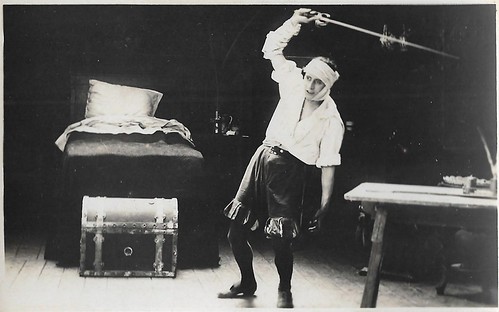
Italian postcard by G.B. Falci, Milano. Photo: Fotominio. Giovanni Schettini as Manfred in Triboulet (Febo Mari, 1923), 1st and 2nd episode.
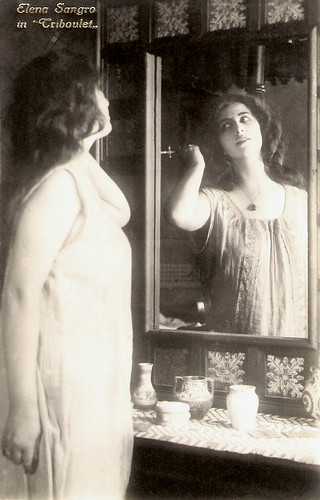
Elena Sangro. Italian postcard by G.B. Falci, Milano. Photo: Cines / UCI. Publicity still for Triboulet (Febo Mari, 1923)
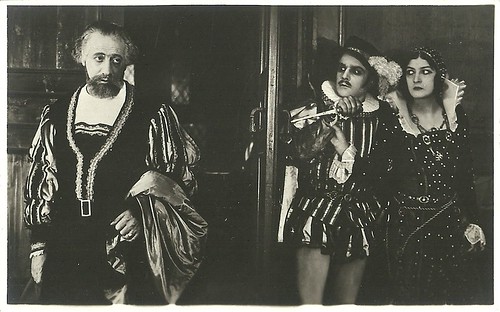
Italian postcard by G.B. Falci, Milano. Photo: Cines / UCI. Publicity still for Triboulet (Febo Mari, 1923), 3rd and 4th episode.
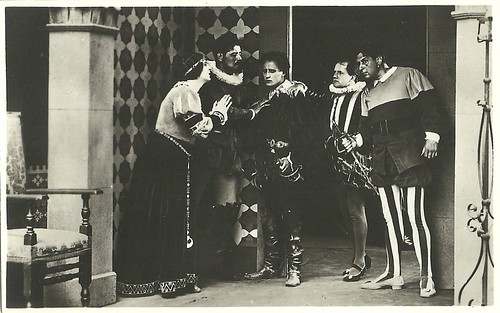
Italian postcard by G.B. Falci, Milano. Photo: Cines / UCI. Publicity still for Triboulet (Febo Mari, 1923), 3rd and 4th episode.
Triboulet (Febo Mari, 1923) was based on the novel 'Triboulet'(1910) by Michele Zévaco. Triboulet was a historical figure. His real name was Nicolas Ferrial (1479-1536), and he was a jester of the kings Louis XII and Francis I of France. He appears in Book 3 of François Rabelais' Pantagrueline chronicles.
Triboulet also appears in Victor Hugo's 'Le Roi s'amuse' and its opera version, Giuseppe Verdi's 'Rigoletto', a blend of 'Triboulet' and French rigoler (to laugh), intended to deflect the censorship that Hugo's work had received. Verdi also turned Triboulet more into a tragic figure.
Triboulet (1923) by Febo Mari was originally released as a six-part serial, then reduced to a three-part serial, and finally just one single feature film of 2.500 metres. The six episodes were titled: 1) The King's Buffoon, 2) The King of the Misers, 3) The Mysteries of the Louvre, 4) The Cour des Miracles, 5) The Revenge of the Nameless, and 6) Delirium of Love.
Umberto Zanuccoli played Triboulet, the king's jester, but in reality, he is a nobleman called Ferrial. Achille Vitti played King Francesco (or Francis I), who dedicates himself to peace after the defeat of Pavia. However, the king does not disdain his notorious love life. At the age of 50, he is tired of Mme de Ferron ('la belle Ferronière') and gets interested in young Gillette, played by film diva Elena Sangro.
Triboulet is a true melodrama with many secret identities. Triboulet raised Gillette, who loves Manfred (Giovanni Schettini), the king of the Cour des Miracles, the Paris slums. Manfred saves Gillette from the clutches of Francis. Francis is, in true melodrama style, in reality Gilette's father by a former mistress, Margentina (Tina Ceccaci Renaldi), now a mad and visionary woman. Hurt in one of his actions, Manfred is saved and cured by an Italian couple, who travel with their servant Spadacappa. Manfred later discovers that the Italian couple are his parents, who have come to France to find him.
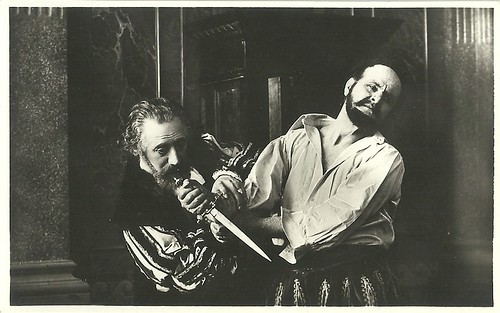
Italian postcard by G.B. Falci, Milano. Photo: Cines / UCI. Publicity still for Triboulet (Febo Mari, 1923), 3rd and 4th episode.

Italian postcard by G.B. Falci, Milano. Photo: Fotominio / Cines / UCI. Achille Vitti as King Francis/ François I of France, Umberto Zanuccoli in the title role, Giovanni Schettini as Manfred, and Elena Sangro as Gillette in Triboulet (Febo Mari, 1923), 3rd and 4th episode.
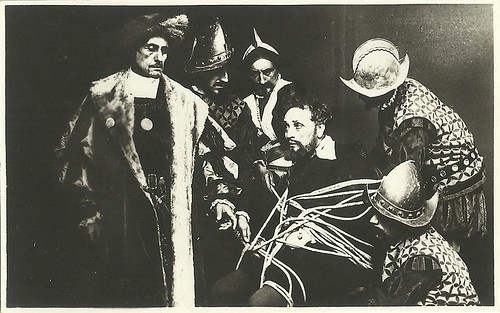
Italian postcard by G.B. Falci, Milano. Photo: Cines / UCI. Publicity still for Triboulet (Febo Mari, 1923).
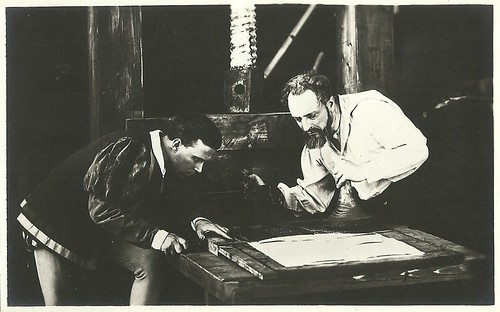
Italian postcard by G.B. Falci, Milano. Photo: Cines / UCI. Publicity still for Triboulet (Febo Mari, 1923).
1. After the defeat of Pavia (1525) and his subsequent imprisonment, the French King Francis I (Achille Vitti) dedicates himself to peace, though not disdaining his notorious love life. At the age of 50, he is tired of Mme de Ferron ('la belle Ferronière'), and gets interested in young Gillette (Elena Sangro), an orphan raised by Triboulet (Umberto Zanuccoli), the king's buffoon, but in reality a nobleman called Ferrial. Mme de Ferron won't stand to have a rival. Gillette instead loves Manfred (Giovanni Schettini), the king of the Cour des Miracles. Manfred fights off all the king's swordsmen but cannot rescue Gillette. Gillette finds refuge at the printer Etienne Dolet (Carlo Gualandri). Francis, in reality is her father by a former mistress, Margentina (Tina Ceccaci Renaldi), now a mad and visionary woman, and asks her to join him at the Louvre. Manfred liberates the locked-up de Ferron, who otherwise would have died, so she is ever so grateful. He himself is then imprisoned, but he manages to escape.
2. Hurt, Manfred is saved and cured by an Italian aristocratic couple, the Count of Ragastens (Totò Majorana) and his wife, who travel with their servant Spadacappa, and are looking for their lost son. Manfred finds Gillette again at the house of the editor Dolet. Instead of the splendour of the Louvre, Gillette selects the modest house of Fleurial, aka Triboulet, the King's buffoon. She thus has two fathers. When she publicly prefers the buffoon, the latter is tortured and imprisoned. Manfred declares his love for Gillette in the King's throne room, causing an enormous sword fight, from which he is rescued at the last moment by Lanthenay (Alfredo Menichelli), his fellow in arms. A huge fire breaks out at the Louvre, caused by Lanthenay and his gang, which Maddalena de Ferron, the scorned ex-mistress of the King, views with mixed feelings, as the King may thus escape her revenge. But the King is still alive.
3. Maddalena de Ferron is set on revenge and has herself become a leper to contaminate the King and his beloved. Having mistaken Gillette for a rival in love, the Duchess of Etampes, royal favourite, hands her over to Margentine, who has descended into madness and almost manages to disfigure her own daughter with acid. Yet, Spadacappa saves Gillette right on time. Manfred is about to be cornered by three cronies from the King, but Maddalena saves him at the last moment. After Manfred has left, Maddalena still swears to avenge herself on the King.
4. Manfred and Lanthenay, both raised in the Paris slums, The Court of Miracles, are the foster sons of Mama Gypsy, who, after her own son was condemned to death by the Provost Monclar (Gino Viotti), stole his son and raised him as a bandit, Lanthenay. Ordered by the King, the provost raids the slums with his army and has Manfred and Lanteney arrested.
5-6. In episodes 5 and 6, other adventures follow, in which Manfred discovers the Italian couple are his parents, who have come to France to find him. Triboulet and Manfred join forces to free Etienne Dolet, accused of having printed heretical works and imprisoned in the Conciergerie, where the executioner awaits him. The trio intends at the same time to defend the Cour des Miracles, whose Grand Provost is preparing to attack it, and to find Gillette, whom the king has taken to Fontainebleau. Through countless twists and turns, Dolet perishes at the stake, Manfred turns out to be the lost son of the Count of Ragastens, and Lanthenay that of the Grand Provost. Margentine regains her sanity and recognises Gillette, with whom Manfred disputes with the king, with his sword. Triboulet sacrifices himself to save Gillette. Broken, François I returns to the Château de Rambouillet and dies there, under the vengeful gaze of Madeleine Ferron, known as the Beautiful Ferronnière.

Italian postcard by G.B. Falci, Milano. Photo: Fotominio. Left, Umberto Zanuccoli as Triboulet in Triboulet (Febo Mari 1923), 5th and 6th episode.

Italian postcard by G.B. Falci, Milano. Photo: Fotominio. Umberto Zanuccoli in the title role of the period piece Triboulet (Febo Mari, 1923), 5th and 6th episode.

Italian postcard by G.B. Falci, Milano. Photo: Fotominio. Elena Sangro as Gillette in Triboulet (Febo Mari, 1923), 5th and 6th episode.
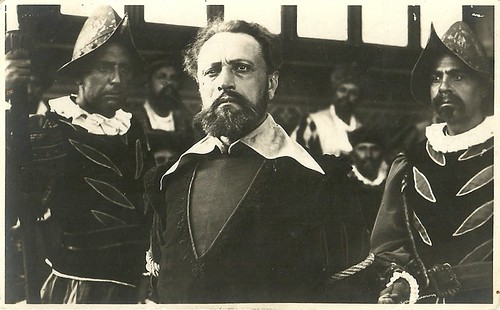
Italian postcard by G.B. Falci, Milano. Photo: Cines / UCI. Publicity still for Triboulet (Febo Mari, 1923), 5th and 6th episode.
Sources: Vittorio Martinelli (Il cinema muto italiano, 1923-1931 - Italian), Herve Dumont, Wikipedia and IMDb.

Italian postcard by G.B. Falci, Milano. Photo: Fotominio. Giovanni Schettini as Manfred in Triboulet (Febo Mari, 1923), 1st and 2nd episode.

Elena Sangro. Italian postcard by G.B. Falci, Milano. Photo: Cines / UCI. Publicity still for Triboulet (Febo Mari, 1923)

Italian postcard by G.B. Falci, Milano. Photo: Cines / UCI. Publicity still for Triboulet (Febo Mari, 1923), 3rd and 4th episode.

Italian postcard by G.B. Falci, Milano. Photo: Cines / UCI. Publicity still for Triboulet (Febo Mari, 1923), 3rd and 4th episode.
Delirium of love
Triboulet (Febo Mari, 1923) was based on the novel 'Triboulet'(1910) by Michele Zévaco. Triboulet was a historical figure. His real name was Nicolas Ferrial (1479-1536), and he was a jester of the kings Louis XII and Francis I of France. He appears in Book 3 of François Rabelais' Pantagrueline chronicles.
Triboulet also appears in Victor Hugo's 'Le Roi s'amuse' and its opera version, Giuseppe Verdi's 'Rigoletto', a blend of 'Triboulet' and French rigoler (to laugh), intended to deflect the censorship that Hugo's work had received. Verdi also turned Triboulet more into a tragic figure.
Triboulet (1923) by Febo Mari was originally released as a six-part serial, then reduced to a three-part serial, and finally just one single feature film of 2.500 metres. The six episodes were titled: 1) The King's Buffoon, 2) The King of the Misers, 3) The Mysteries of the Louvre, 4) The Cour des Miracles, 5) The Revenge of the Nameless, and 6) Delirium of Love.
Umberto Zanuccoli played Triboulet, the king's jester, but in reality, he is a nobleman called Ferrial. Achille Vitti played King Francesco (or Francis I), who dedicates himself to peace after the defeat of Pavia. However, the king does not disdain his notorious love life. At the age of 50, he is tired of Mme de Ferron ('la belle Ferronière') and gets interested in young Gillette, played by film diva Elena Sangro.
Triboulet is a true melodrama with many secret identities. Triboulet raised Gillette, who loves Manfred (Giovanni Schettini), the king of the Cour des Miracles, the Paris slums. Manfred saves Gillette from the clutches of Francis. Francis is, in true melodrama style, in reality Gilette's father by a former mistress, Margentina (Tina Ceccaci Renaldi), now a mad and visionary woman. Hurt in one of his actions, Manfred is saved and cured by an Italian couple, who travel with their servant Spadacappa. Manfred later discovers that the Italian couple are his parents, who have come to France to find him.

Italian postcard by G.B. Falci, Milano. Photo: Cines / UCI. Publicity still for Triboulet (Febo Mari, 1923), 3rd and 4th episode.

Italian postcard by G.B. Falci, Milano. Photo: Fotominio / Cines / UCI. Achille Vitti as King Francis/ François I of France, Umberto Zanuccoli in the title role, Giovanni Schettini as Manfred, and Elena Sangro as Gillette in Triboulet (Febo Mari, 1923), 3rd and 4th episode.

Italian postcard by G.B. Falci, Milano. Photo: Cines / UCI. Publicity still for Triboulet (Febo Mari, 1923).

Italian postcard by G.B. Falci, Milano. Photo: Cines / UCI. Publicity still for Triboulet (Febo Mari, 1923).
6 episodes
1. After the defeat of Pavia (1525) and his subsequent imprisonment, the French King Francis I (Achille Vitti) dedicates himself to peace, though not disdaining his notorious love life. At the age of 50, he is tired of Mme de Ferron ('la belle Ferronière'), and gets interested in young Gillette (Elena Sangro), an orphan raised by Triboulet (Umberto Zanuccoli), the king's buffoon, but in reality a nobleman called Ferrial. Mme de Ferron won't stand to have a rival. Gillette instead loves Manfred (Giovanni Schettini), the king of the Cour des Miracles. Manfred fights off all the king's swordsmen but cannot rescue Gillette. Gillette finds refuge at the printer Etienne Dolet (Carlo Gualandri). Francis, in reality is her father by a former mistress, Margentina (Tina Ceccaci Renaldi), now a mad and visionary woman, and asks her to join him at the Louvre. Manfred liberates the locked-up de Ferron, who otherwise would have died, so she is ever so grateful. He himself is then imprisoned, but he manages to escape.
2. Hurt, Manfred is saved and cured by an Italian aristocratic couple, the Count of Ragastens (Totò Majorana) and his wife, who travel with their servant Spadacappa, and are looking for their lost son. Manfred finds Gillette again at the house of the editor Dolet. Instead of the splendour of the Louvre, Gillette selects the modest house of Fleurial, aka Triboulet, the King's buffoon. She thus has two fathers. When she publicly prefers the buffoon, the latter is tortured and imprisoned. Manfred declares his love for Gillette in the King's throne room, causing an enormous sword fight, from which he is rescued at the last moment by Lanthenay (Alfredo Menichelli), his fellow in arms. A huge fire breaks out at the Louvre, caused by Lanthenay and his gang, which Maddalena de Ferron, the scorned ex-mistress of the King, views with mixed feelings, as the King may thus escape her revenge. But the King is still alive.
3. Maddalena de Ferron is set on revenge and has herself become a leper to contaminate the King and his beloved. Having mistaken Gillette for a rival in love, the Duchess of Etampes, royal favourite, hands her over to Margentine, who has descended into madness and almost manages to disfigure her own daughter with acid. Yet, Spadacappa saves Gillette right on time. Manfred is about to be cornered by three cronies from the King, but Maddalena saves him at the last moment. After Manfred has left, Maddalena still swears to avenge herself on the King.
4. Manfred and Lanthenay, both raised in the Paris slums, The Court of Miracles, are the foster sons of Mama Gypsy, who, after her own son was condemned to death by the Provost Monclar (Gino Viotti), stole his son and raised him as a bandit, Lanthenay. Ordered by the King, the provost raids the slums with his army and has Manfred and Lanteney arrested.
5-6. In episodes 5 and 6, other adventures follow, in which Manfred discovers the Italian couple are his parents, who have come to France to find him. Triboulet and Manfred join forces to free Etienne Dolet, accused of having printed heretical works and imprisoned in the Conciergerie, where the executioner awaits him. The trio intends at the same time to defend the Cour des Miracles, whose Grand Provost is preparing to attack it, and to find Gillette, whom the king has taken to Fontainebleau. Through countless twists and turns, Dolet perishes at the stake, Manfred turns out to be the lost son of the Count of Ragastens, and Lanthenay that of the Grand Provost. Margentine regains her sanity and recognises Gillette, with whom Manfred disputes with the king, with his sword. Triboulet sacrifices himself to save Gillette. Broken, François I returns to the Château de Rambouillet and dies there, under the vengeful gaze of Madeleine Ferron, known as the Beautiful Ferronnière.

Italian postcard by G.B. Falci, Milano. Photo: Fotominio. Left, Umberto Zanuccoli as Triboulet in Triboulet (Febo Mari 1923), 5th and 6th episode.

Italian postcard by G.B. Falci, Milano. Photo: Fotominio. Umberto Zanuccoli in the title role of the period piece Triboulet (Febo Mari, 1923), 5th and 6th episode.

Italian postcard by G.B. Falci, Milano. Photo: Fotominio. Elena Sangro as Gillette in Triboulet (Febo Mari, 1923), 5th and 6th episode.

Italian postcard by G.B. Falci, Milano. Photo: Cines / UCI. Publicity still for Triboulet (Febo Mari, 1923), 5th and 6th episode.
Sources: Vittorio Martinelli (Il cinema muto italiano, 1923-1931 - Italian), Herve Dumont, Wikipedia and IMDb.
No comments:
Post a Comment